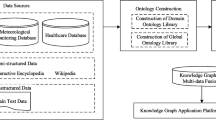Abstract
The paper considers the task of building the ontological structure of knowledge in the intelligent assistant systems to reduce the structural and semantic conflicts in the process of searching, accumulation, and processing of information objects in the Internet. The authors develop the semantic net providing the integrated representation of knowledge on user preferences, semantic images of the Internet resource, and search domain in the ontological model. To solve the problem, we propose a method for cluster analysis of the Internet-object structure. This allows us to divide the vector space of the features into semantic clusters with the constraints on the hidden patterns features revealing the content risks. To carry out the experiments on a test set of search queries, we developed a search module for the intelligent assistant system. The estimated relevance coefficient of “query-resource” is 60% higher than manually formed user preferences in popular search systems.
Access this chapter
Tax calculation will be finalised at checkout
Purchases are for personal use only
Similar content being viewed by others
References
Bova, V., Kravchenko, Yu., Rodzin, S., Kuliev, E.: Hybrid method for prediction of users’ information behavior in the Internet based on bioinspired search. J. Phys. Conf. Ser. (2019). https://doi.org/10.1088/1742-6596/1333/3/032008
Deliang, W., Lingling, X., Chuan, C.H.: Understanding the continuance use of social network sites: a computer self-efficacy perspective. J. Behav. Inf. Technol. 34, 204–216 (2015)
Zhang, Y.: Undergraduate students’ mental models of the Web as an information retrieval system. J. Am. Soc. Inform. Sci. Technol. 59(13), 2087–2098 (2008)
Kravchenko, Y.A., Kuliev, E.V., Kursitys, I.O.: Information’s semantic search, classification, structuring and integration objectives in the knowledge management context problems. In: 8th IEEE International Conference on Application of Information and Communication Technologies – AICT 2016, Baku, Azerbaijan, pp. 136–141. IEEE Press (2016)
Tingting, Z., Chen, L.Y., Liang-Hsien, T.: Understanding user motivation for evaluating online content: a self-determination theory perspective. J. Behav. Inf. Technol. 34, 479–491 (2015)
Jalalirad, A., Tjalkens, T.: Using feature-based models with complexity penalization for selecting features. J. Signal Process. Syst. 90(2), 201–210 (2018)
Kravchenko, Y., Bova, V.: Assessment of ontological structures semantic similarity based on a modified cuckoo search algorithm. In: IOP Conference Series: Materials Science and Engineering, Krasnoyarsk, Russia, p. 12018 (2020)
Rogushina, J.: Analysis of automated matching of the semantic wiki resources with elements of domain ontologies. Int. J. Math. Sci. Comput. (IJMSC) 3(3), 50–58 (2017)
Corcho, O., Ruiz-Iniesta, A.: A review of ontologies for describing scholarly and scientific documents. In: 4th Workshop on Semantic Publishing, co-located with the 11th Extended Semantic Web Conference (ESWC 2014), Anissaras, Greece, 12 p. (2014)
Rogushina, J., Gladun, A.: Ontology-based competency analyses in new research domains. J. Comput. Inf. Technol. 20(4), 277–293 (2012)
Bova, V.V., Kureichik, V.V., Leshchanov, D.V.: The model of semantic similarity estimation for the problems of big data search and structuring. In: 11th IEEE International Conference on Application of Information and Communication Technologies - AICT 2017, pp. 27–32 (2017)
Kravchenko, Yu.A., Markov, V.V., Kursitys, I.O.: Bioinspired algorithm for acquiring new knowledge based on information resource classification. In: Proceedings of IEEE International Russian Automation Conference (RusAutoCon), Sochi, Russia, pp. 1–5 (2019)
Dikovitsky, V.V., Nikulina, N. V., Shishaev, M.G.: Architecture and technologies of knowledge-based multi-domain information systems for industrial purposes. In: 5th Computer Science Online Conference (CSOC2016), vol 3. pp. 359–369 (2016)
Brandtzaeg, P., Folstad, A.: Trust and distrust in online fact-checking services. J. Commun. ACM 60(9), 65–71 (2017)
Gruber, T.: Collective knowledge systems: where the Social Web meets the Semantic Web. J. Web Semant. 6(1), 4–13 (2008)
Khotilin, M.I. Blagov, A.V.: Visualization and cluster analysis of social networks. In: CEUR Workshop Proceedings, vol. 1638, pp. 843–850 (2016)
Kursitys, I., Natskevich, A., Tsyrulnikova, E.: Boosting model of bioinspired algorithms for solving the classification and clustering problems. In: Proceedings of IEEE East-West Design & Test Symposium (EWDTS), Batumi, Georgia, pp. 1–6 (2019)
Acknowledgment
The reported study was funded by RFBR according to the research project № 18-29-22019.
Author information
Authors and Affiliations
Editor information
Editors and Affiliations
Rights and permissions
Copyright information
© 2021 Springer Nature Singapore Pte Ltd.
About this paper
Cite this paper
Bova, V.V., Kravchenko, Y.A., Rodzin, S.I., Kuliev, E.V. (2021). Simulation of the Semantic Network of Knowledge Representation in Intelligent Assistant Systems Based on Ontological Approach. In: Singh, P.K., Veselov, G., Pljonkin, A., Kumar, Y., Paprzycki, M., Zachinyaev, Y. (eds) Futuristic Trends in Network and Communication Technologies. FTNCT 2020. Communications in Computer and Information Science, vol 1396. Springer, Singapore. https://doi.org/10.1007/978-981-16-1483-5_22
Download citation
DOI: https://doi.org/10.1007/978-981-16-1483-5_22
Published:
Publisher Name: Springer, Singapore
Print ISBN: 978-981-16-1482-8
Online ISBN: 978-981-16-1483-5
eBook Packages: Computer ScienceComputer Science (R0)




